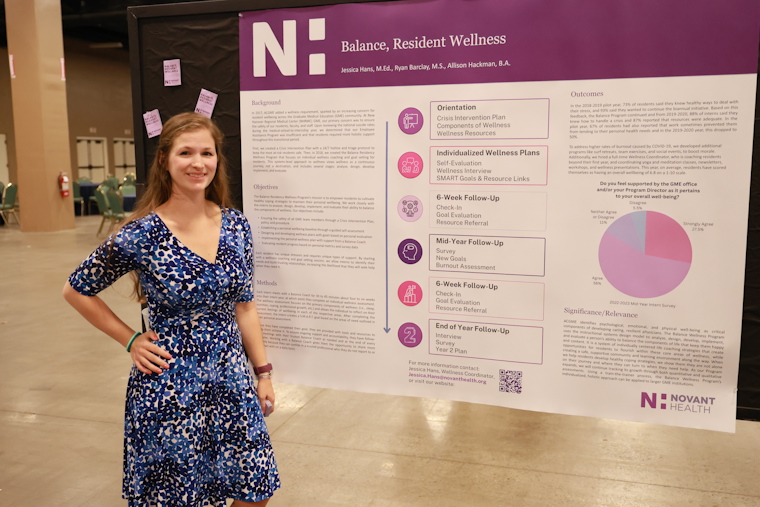Over the last decade, the graduate medical education (GME) community has increasingly focused on the well-being of residents and fellows, reducing burnout, and preventing suicide completion. Additionally, research shows that suicide completion among residents typically occurs early in the educational program (the first two years).
In the poster “Balance, Resident Wellness,” Wellness Coordinator Jessica Hans, MEd and her team from Novant Health New Hanover Regional Medical Center, South East Area Health Education Center in North Carolina, discuss a well-being intervention designed to help first-year residents just starting their careers develop strong, individualized coping skills for stress. The team presented their work in the Poster Hall at the 2023 ACGME Annual Educational Conference, held February 23-25, 2023, in Nashville, Tennessee.
Poster Title: Balance, Resident Wellness
Primary Author: Jessica Hans, MEd
Co-Authors: Ryan Barclay, MS; Allison Hackman, BA
ACGME: Tell us about your academic and professional role.
Hans: I serve as the wellness coordinator for both GME and undergraduate medical education (UME). Ryan is the GME director. Allison was an intern with the GME Research Department.
ACGME: Can you briefly describe your research project for us?
Hans: Our innovative project created a system for resident wellness designed with the individual wellness needs of our residents at the core of the program. It started as education around crisis management and connecting residents with internal resources. It then grew into an individualized program that introduces wellness at residency orientation, engages residents in a one-on-one wellness interview, and guides them in creating SMART [Specific, Measurable, Attainable, Realistic, and Time-bound] goals based on the individual resident’s needs. We connect the residents to resources within our organization, locally, or nationally to help break down barriers to achieving their goals.
ACGME: What inspired you to do this project?
Hans: After Ryan Barclay attended an ACGME conference in 2017, and understanding the magnitude that UME and GME can have on mental health, it was time to assess our current infrastructure. Realizing that some of the internal resources we had were not enough, creating our own system was the logical next step. After ensuring we were able to educate our faculty and staff members and residents on handling a crisis, we looked to creating a program that supported them to have healthy and successful careers. We understood that if they aren’t at their best, they can’t give their best in patient care and would not be the best doctors they could be.
ACGME: What did you discover?
Hans: Creating a proactive approach to wellness significantly had a positive impact within our program. During the first year, 2018-2019, 73 percent of first-year residents said they knew healthy ways to deal with stress. In 2019-2020, 88 percent of first-year residents said they knew how to handle a crisis. Fast forward to this year, in the 2022-2023 first-year resident class, 95 percent strongly agreed or agreed that they knew how to handle a crisis. Taking the approach of treating the whole person and not just one single aspect of wellness was crucial.
ACGME: What was the main takeaway?
Hans: Wellness is not an event, survey, or a presentation. It’s a journey that fluctuates over time, based on what we are faced with in our lives. This year’s first-year residents shared that of those who achieved their wellness goal in the first quarter (74 percent), 83 percent said it helped their overall well-being. They shared that having a goal built around their interests helped them balance all the things they have going on. Helping them transition from medical school to residency and knowing that they have an outlet outside of their individual educational programs allowed them to be vulnerable and to find the support to be successful early on in their careers.
ACGME: Who could benefit from this?
Hans: All physicians, nurses, faculty members, support staff members, and medical students could benefit from this type of intervention. Physicians don’t operate in a vacuum, so the healthier the environment and the people, the better we all will be for our patients.
ACGME: Any additional follow-up plans?
Hans: We currently only offer the individualized wellness program to the first-year residents. However, with the addition of a full-time wellness coordinator, the third-year medical students will be offered coaching to help the transition from classroom to hands-on learning. We also plan on continuing the individualized approach as physicians move through residency—not just first year—in conjunction with the other wellness programming and services we offer.

